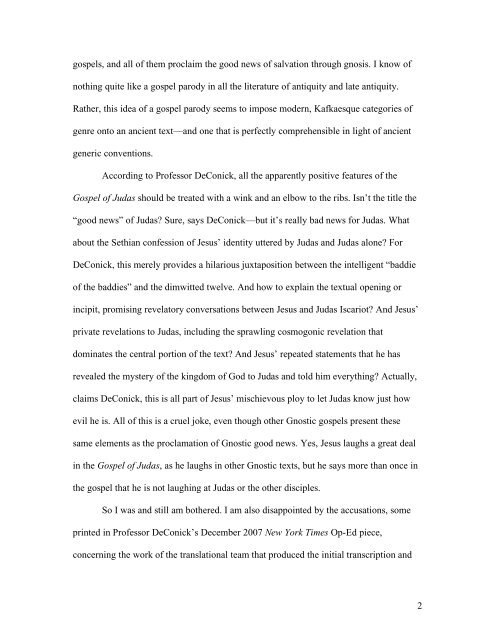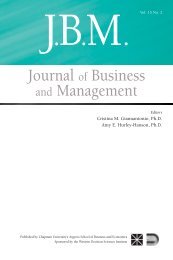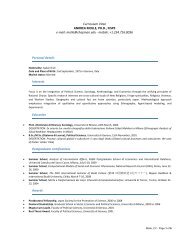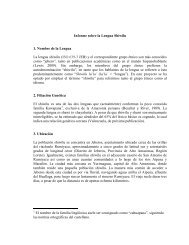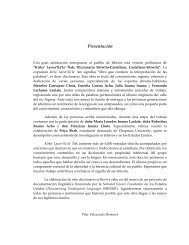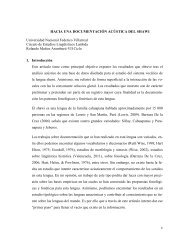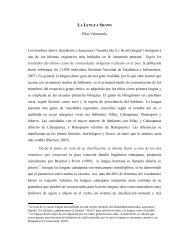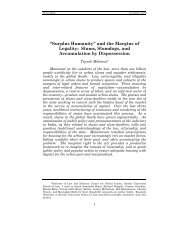The Thirteenth Daimon: Judas and Sophia in the Gospel of Judas
The Thirteenth Daimon: Judas and Sophia in the Gospel of Judas
The Thirteenth Daimon: Judas and Sophia in the Gospel of Judas
You also want an ePaper? Increase the reach of your titles
YUMPU automatically turns print PDFs into web optimized ePapers that Google loves.
gospels, <strong>and</strong> all <strong>of</strong> <strong>the</strong>m proclaim <strong>the</strong> good news <strong>of</strong> salvation through gnosis. I know <strong>of</strong>noth<strong>in</strong>g quite like a gospel parody <strong>in</strong> all <strong>the</strong> literature <strong>of</strong> antiquity <strong>and</strong> late antiquity.Ra<strong>the</strong>r, this idea <strong>of</strong> a gospel parody seems to impose modern, Kafkaesque categories <strong>of</strong>genre onto an ancient text—<strong>and</strong> one that is perfectly comprehensible <strong>in</strong> light <strong>of</strong> ancientgeneric conventions.Accord<strong>in</strong>g to Pr<strong>of</strong>essor DeConick, all <strong>the</strong> apparently positive features <strong>of</strong> <strong>the</strong><strong>Gospel</strong> <strong>of</strong> <strong>Judas</strong> should be treated with a w<strong>in</strong>k <strong>and</strong> an elbow to <strong>the</strong> ribs. Isn’t <strong>the</strong> title <strong>the</strong>“good news” <strong>of</strong> <strong>Judas</strong>? Sure, says DeConick—but it’s really bad news for <strong>Judas</strong>. Whatabout <strong>the</strong> Sethian confession <strong>of</strong> Jesus’ identity uttered by <strong>Judas</strong> <strong>and</strong> <strong>Judas</strong> alone? ForDeConick, this merely provides a hilarious juxtaposition between <strong>the</strong> <strong>in</strong>telligent “baddie<strong>of</strong> <strong>the</strong> baddies” <strong>and</strong> <strong>the</strong> dimwitted twelve. And how to expla<strong>in</strong> <strong>the</strong> textual open<strong>in</strong>g or<strong>in</strong>cipit, promis<strong>in</strong>g revelatory conversations between Jesus <strong>and</strong> <strong>Judas</strong> Iscariot? And Jesus’private revelations to <strong>Judas</strong>, <strong>in</strong>clud<strong>in</strong>g <strong>the</strong> sprawl<strong>in</strong>g cosmogonic revelation thatdom<strong>in</strong>ates <strong>the</strong> central portion <strong>of</strong> <strong>the</strong> text? And Jesus’ repeated statements that he hasrevealed <strong>the</strong> mystery <strong>of</strong> <strong>the</strong> k<strong>in</strong>gdom <strong>of</strong> God to <strong>Judas</strong> <strong>and</strong> told him everyth<strong>in</strong>g? Actually,claims DeConick, this is all part <strong>of</strong> Jesus’ mischievous ploy to let <strong>Judas</strong> know just howevil he is. All <strong>of</strong> this is a cruel joke, even though o<strong>the</strong>r Gnostic gospels present <strong>the</strong>sesame elements as <strong>the</strong> proclamation <strong>of</strong> Gnostic good news. Yes, Jesus laughs a great deal<strong>in</strong> <strong>the</strong> <strong>Gospel</strong> <strong>of</strong> <strong>Judas</strong>, as he laughs <strong>in</strong> o<strong>the</strong>r Gnostic texts, but he says more than once <strong>in</strong><strong>the</strong> gospel that he is not laugh<strong>in</strong>g at <strong>Judas</strong> or <strong>the</strong> o<strong>the</strong>r disciples.So I was <strong>and</strong> still am bo<strong>the</strong>red. I am also disappo<strong>in</strong>ted by <strong>the</strong> accusations, somepr<strong>in</strong>ted <strong>in</strong> Pr<strong>of</strong>essor DeConick’s December 2007 New York Times Op-Ed piece,concern<strong>in</strong>g <strong>the</strong> work <strong>of</strong> <strong>the</strong> translational team that produced <strong>the</strong> <strong>in</strong>itial transcription <strong>and</strong>2


